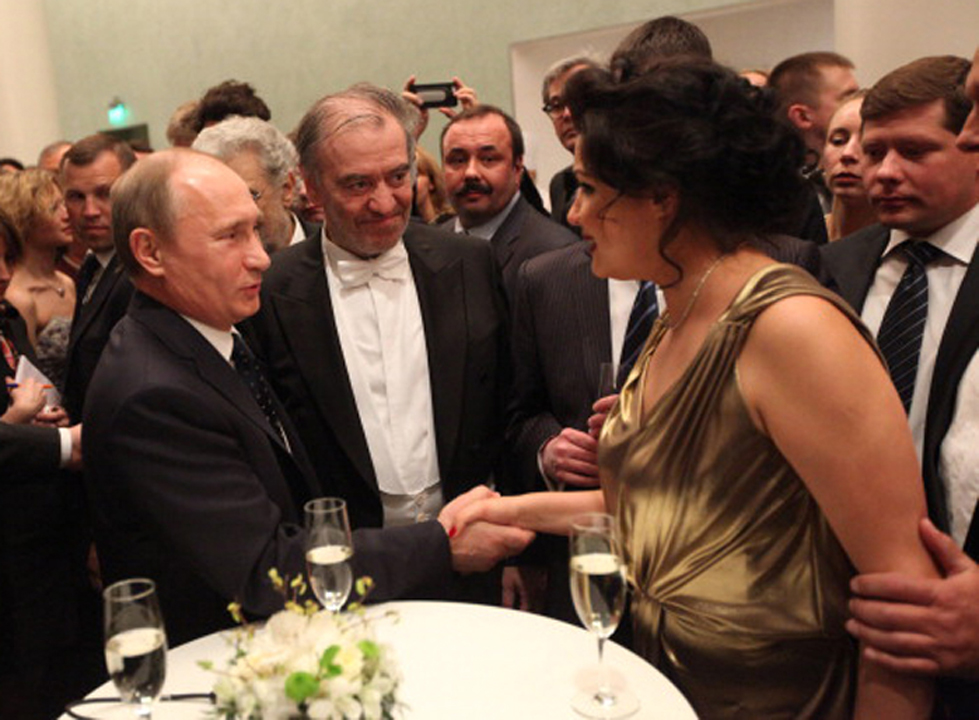
Controversy continues to surround Russian conductor Valery Gergiev and opera singer Anna Netrebko. Both of them are close friends of Russia’s President, Vladimir Putin. Indeed, Gergiev and Putin are said to be Godfathers to each other’s children. Until the outbreak of hostilities in Gergiev’s home region of Ossetia, the conductor kept his political views to himself. He complained that the West attempts to politicize Russian composers for what he described as “propaganda wars” perpetuated by “boring people who don’t hear the music.”
Contradicting his own stance, Gergiev chose to politicize his position when the Russian Federation invaded Georgia. The maestro openly supported Russia’s aggression, even though it meant betraying his native land. From that point forward, Gergiev used his celebrity status to promote his political views. His views could be summed up quite simply: no matter how draconian, the conductor blindly supports all of Putin’s policies.
Gergiev defended Putin’s crackdown on gay rights, although he attempted to backtrack in light of protests at New York’s Metropolitan Opera, Carnegie Hall and at the Barbican in London. Gergiev also supported Putin’s harsh handling of the Pussy Riot’s Moscow church protest, which resulted in a two-year prison sentence for members of the punk group. Gergiev suggested that the controversial performance was designed to create publicity and to boost the careers of the performers. “I don’t think this is anything to do with artistic freedom,” Gergiev told The Independent. He added: “I am told by too many people that those girls are potentially a very good business proposition. Suppose that someone created all this in order to produce another touring group earning millions and millions? Anna Netrebko didn’t need to do something like this.”
When Russia annexed Crimea and funded terrorism in Ukraine, Gergiev happily supported Putin’s policies yet again. Gergiev publicly endorsed Russia’s illicit activities by adding his signature to a letter of support published by the Russian Ministry of Culture. After all, Gergiev was able to persuade his friend Putin to invest 20 billion rubles of the government’s money into the new state-of-the-art 2,000 seat Mariinsky opera house, which is headed by the shrewd maestro. Putin’s government is largely based on mafia-like friendships, which transformed a number of his personal friends into billionaires. The Russian propaganda machine is notorious for using artists and celebrities to promote the official position of the government. Gergiev disingenuously exclaims: “The Russian Government, the Kremlin and President Putin will continue to fight corruption. That’s the only story which worries the Russian people.”
Opera singer Anna Netrebko, who is close with both Putin and Gergiev, also chose to support Russia’s aggression against Ukraine. She held up the flag of nonexistent “Novorossiya” and posed with terrorist leader, Oleg Tsarov, after handing him a check for 1 million rubles. Tsarov is wanted by the Ukrainian government on charges of separatism and is also on the list of individuals sanctioned by the EU for their role in events in Eastern Ukraine. President of Ukraine Petro Poroshenko clarified: “Those armed in Eastern Ukraine should not be referred to as “separatists.” There are no separatists there. They are terrorists.”
Tsarov was also sanctioned by the United States as a person who poses a threat to national security. Executive order signed by President Barack Obama with respect to the sanctions stated that “the actions and policies of persons including persons who have asserted governmental authority in the Crimean region without the authorization of the Government of Ukraine that undermine democratic processes and institutions in Ukraine; threaten its peace, security, stability, sovereignty, and territorial integrity; and contribute to the misappropriation of its assets, constitute an unusual and extraordinary threat to the national security and foreign policy of the United States.” Netrebko could face sanctions for providing material support to Tsarov as a sanctioned individual, since the Presidential order specifically prohibits “the making of any contribution or provision of funds, goods, or services by, to, or for the benefit of any person whose property and interests in property are blocked pursuant to this order.” The opera star owns residential properties and spends extensive time periods living in the United States.
For supporting Russia’s aggressive activities in Ukraine, Gergiev and Netrebko continue to face the wrath of outraged protesters. The activists will picket Gergiev’s upcoming performances at the Brooklyn Academy of Music (BAM), which are set to commence on Jan. 14, 2015 with a performance of Rodion Shchedrin’s “The Enchanted Wanderer.” Shockingly, the Brooklyn Academy of Music (BAM) lists Russia’s Sberbank and VTB as its principal partners in this production. Both of these banks are on the list of sanctioned financial institutions. About 40% of VTB Capital’s profits come from its international business. The company claims to be wholly unaffected by the sanctions.
The protesters will also target Netrebko’s performances at the Metropolitan Opera, which will be accompanied by an orchestra conducted by Gergiev and are scheduled to start on Jan. 26, 2015. “We want to make sure that when these artists show up in the West, that the public is well aware of what they’ve been doing,” Julia Khodor Beloborodov, founder of a group called Arts Against Aggression, told RFE/RL.
Announcement by Arts Against Aggression states that concert halls, presenters and orchestras in the United States should “cancel any collaboration with those musicians who publicly approve the fascist policies of President Putin.” Artists are certainly entitled to their own political positions. However, when their star status is used to promote illicit agendas of tyrannical governments, the public can and should protest such abuse of the arts for political motives.

